
Best Freestanding Bathtubs – Five Material Selection Guide
2024-05-15 15:30When it comes to bathroom design, choosing the best freestanding tubs material is crucial. But with a variety of materials, you may be stuck in a dilemma. don’t worry! This article will explore freestanding bathtubs in five materials: acrylic, cast iron, ceramic, artificial stone, and fiberglass, analyzing their pros and cons to help you make an informed choice.
What Are the Best Materials for a Freestanding Bathtub?
Everyone has a different opinion on the best freestanding bathtub materials. Regardless, there are generally several factors to consider when choosing the best freestanding tubs material, including durability, antibacterial properties, appearance, and cost. Popular freestanding bathtub materials currently include acrylic, cast iron, ceramic, artificial stone, and fiberglass. Each material has its own unique characteristics and applicable scenarios.
According to the 2021 U.S. Houzz Bathroom Trends Study, acrylic freestanding tubs are the most popular material because of their wide range of color and texture options, lightweight and easy installation, and ease of cleaning and maintenance.
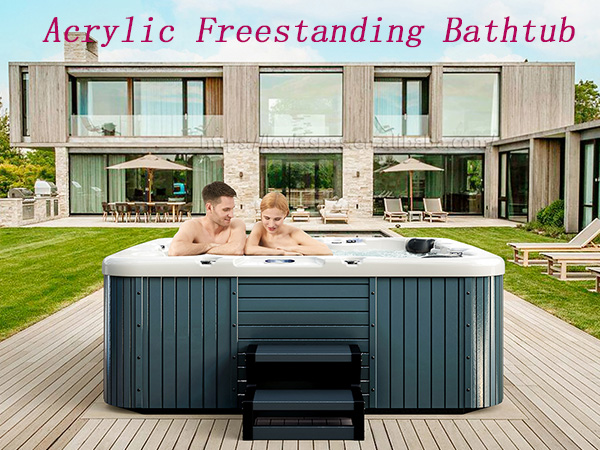
How to Choose the Best Freestanding Bathtub Material?
But no matter what kind of material, it can't be 100% perfect. There will be advantages and disadvantages. Below I’ll compare the pros and cons of 5 freestanding bathtub materials, as well as their price ranges. You can refer to the differences between them to find the best freestanding tubs material for you.
1. Acrylic Freestanding Tubs: Pros, Cons and Price Range
Acrylic freestanding bathtubs are a man-made synthetic material, also known as polymethylmethacrylate (PMMA), that is lightweight, easy to work with, and soft. Acrylic freestanding tubs often have a smooth, seamless appearance that suits modern bathroom designs.
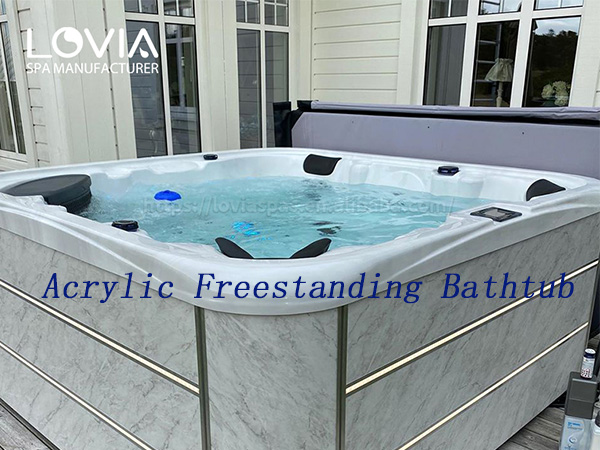
Pros for Acrylic Tubs:
● Acrylic bathtubs are a relatively lightweight option, with a simpler installation process and no need for special support structures.
● Acrylic has good thermal insulation properties and can maintain water temperature for a long time, making bathing more comfortable.
● Acrylic tubs can be made into various shapes and sizes to meet different bathroom design needs.
Cons for Acrylic Tubs:
● Acrylic is relatively susceptible to scratches and may deform in extreme temperatures.
● Compared to cast iron or ceramic, acrylic has lower durability and may develop color changes or cracks after long-term use.
Price Range for Acrylic Bathtubs:
● Compared to other high-end materials, acrylic bathtubs are relatively affordable. Prices typically range from $200 to $2,000, depending on the size, brand, and features of the tub. Some simple, standard-sized acrylic tubs may cost between $200 and $500, while acrylic tubs with more features or custom designs may cost over $1,000.
2. Cast Iron Freestanding Tubs: Pros, Cons and Price Range
Cast iron freestanding bathtubs are strong and durable bathtubs made from cast iron material. Cast iron bathtubs are strong and durable, and often have a classic and elegant design. This type of bathtub is commonly found in traditional or retro-style bathrooms and is relatively heavy and requires strong floor support. Cast iron bathtubs are formed by melting cast iron and pouring it into molds, giving it an elegant appearance and weight.
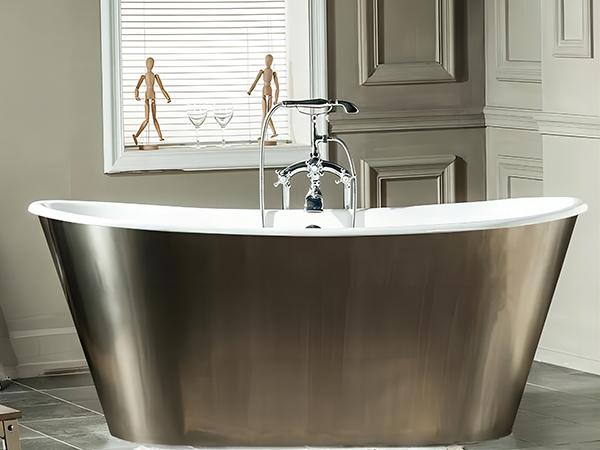
Pros for Cast Iron Tubs:
●Cast iron tubs are one of the most durable options, maintaining their appearance and structure for a long time.
● Cast iron can retain heat well, allowing the water temperature to be maintained longer, allowing you to enjoy a longer, comfortable bath.
●Cast iron bathtubs often have a classic, elegant appearance, adding character to the bathroom
Cons for Cast Iron Tubs:
●Cast iron tubs are very heavy and difficult to install and transport, requiring a strong support structure.
●Cast iron bathtubs are generally more expensive than other materials and may be out of the average budget.
Price Range for Cast Iron Bathtubs:
●Cast iron bathtub prices usually range from $800 to $4,000. Cast iron bathtubs are generally more expensive than other materials due to their weight and manufacturing complexity. A standard cast iron tub in a smaller size may cost between $800 and $1,500, while a larger size or specially designed cast iron tub may cost over $4,000.
3. Ceramic Freestanding Tubs: Pros, Cons and Price Range
A ceramic freestanding bathtub is a bathtub made of ceramic materials, usually made of ceramic blanks fired at high temperatures. This material is smooth, strong and durable, making it suitable for a variety of bathroom styles.
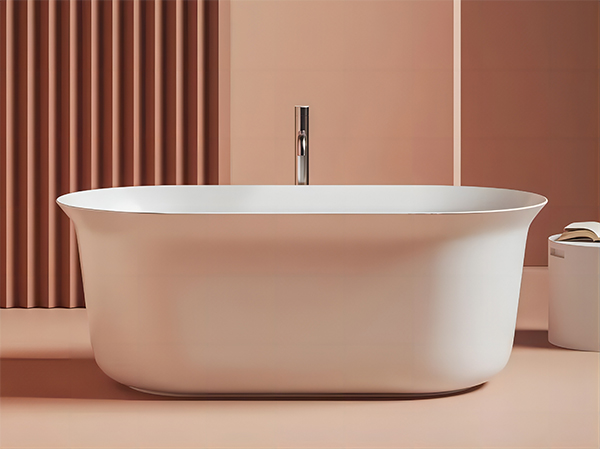
Pros for Ceramic Tubs:
● Ceramic bathtubs have a classic look that suits every bathroom style.
●Smooth surface, not easy to stain, easy to clean.
●The ceramic material itself is antibacterial and can effectively prevent bacterial growth.
Cons for Ceramic Tubs:
●Ceramic materials are relatively fragile and are easily cracked or damaged when bumped or dropped.
●Compared with cast iron, ceramic has poorer thermal insulation properties and the water temperature may drop faster.
●Ceramic bathtubs are usually more expensive and generally not suitable for all budgets.
Price Range for Ceramic Bathtubs:
●Ceramic bathtubs can cost between $600 and $3,000. The price of ceramic bathtubs depends on the brand, design and size. Smaller, standard-sized ceramic tubs may cost between $600 and $1,000, while large, luxuriously designed ceramic tubs may cost over $3,000.
4. Faux Stone Freestanding Tubs: Pros, Cons and Price Range
A faux stone freestanding bathtub is a bathtub made from synthetic materials, usually by mixing quartz, resin, and other fillers. Artificial stone bathtubs offer a wide range of color options and design freedom to meet a variety of customization needs.
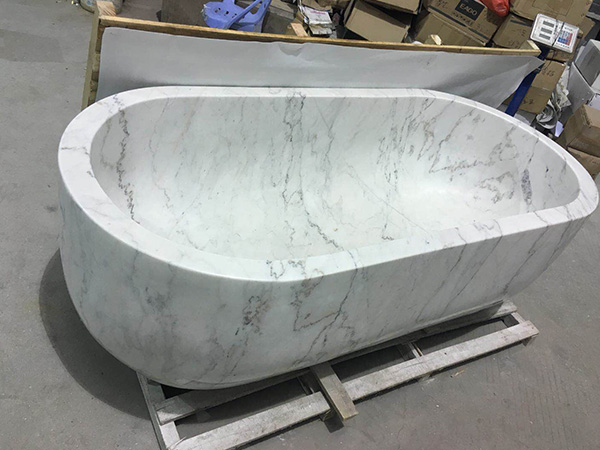
Pros for Faux Stone Tubs:
●faux stone bathtubs can be customized into various shapes and sizes to adapt to different bathroom spaces and bring unique beauty to the bathroom.
●faux stone materials can better retain heat, maintain the water temperature longer, and provide a comfortable bathing experience.
●faux stone material has good durability, is not easy to be worn, damaged or deformed, and can maintain a good appearance for a long time.
Cons for Faux Stone Tubs:
●The customization cost of artificial stone bathtubs is relatively high. Compared with other common materials, it is more expensive and may exceed the general budget.
●Artificial stone is relatively heavy, and installation and transportation require professional tools and manpower.
● After long-term use, the surface of the artificial stone bathtub may become discolored or worn and requires regular maintenance.
Price Range for Faux Stone Bathtubs:
●The price of a faux stone bathtub may range from $1,000 to more than $5,000. The price of artificial stone bathtubs varies based on the quality of their materials and degree of customization. A simpler artificial stone bathtub may cost between $1,000 and $2,000, while a high-end custom-designed faux stone tub may cost over $5,000.
5. Fiberglass Freestanding Tubs: Pros, Cons and Price Range
Fiberglass freestanding bathtubs are made from fiberglass material, which is lightweight, strong and durable. Fiberglass bathtubs are typically molded by mixing fiberglass with resin and are suitable for a variety of bathroom spaces.
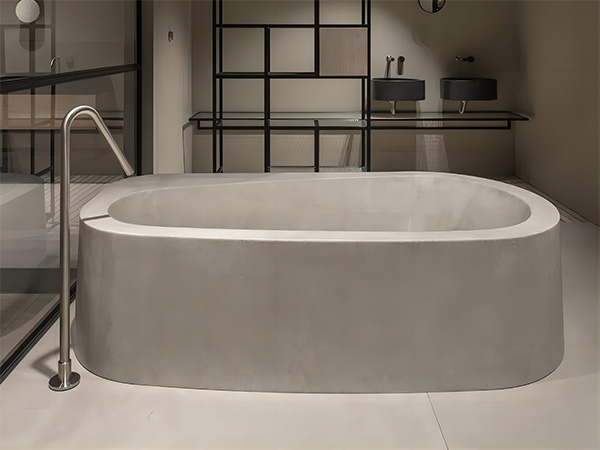
Pros for Fiberglass Tubs:
●Fiberglass bathtubs are very lightweight and the installation process is relatively simple, requiring no special support structures.
●Fiberglass prices are generally more affordable and suitable for all budgets.
●Glass fiber has good corrosion resistance and is not easily affected by humidity and chemical substances.
Cons for Fiberglass Tubs:
●Fiberglass bathtubs have poorer durability than other materials and are prone to wear and deformation.
●The thermal insulation performance of fiberglass is not as good as other materials, and the water temperature may drop faster.
●The surface of fiberglass is easily scratched and needs to be used and maintained with care.
Price Range for Fiberglass Bathtubs:
●Fiberglass bathtubs can cost between $300 and $2,000. Fiberglass tubs are relatively inexpensive, with price depending on material quality and size. A smaller, simple-design fiberglass tub may cost between $300 and $800, while a larger size or more intricately designed fiberglass tub may cost over $2,000.
Find the Best Freestanding Tubs for You on LOVIASPA
Hopefully the above bathtub selection guide will help you find the best freestanding bathtubs. If you are looking for high-quality, personalized bathtubs, why not come to our official website to explore more options.
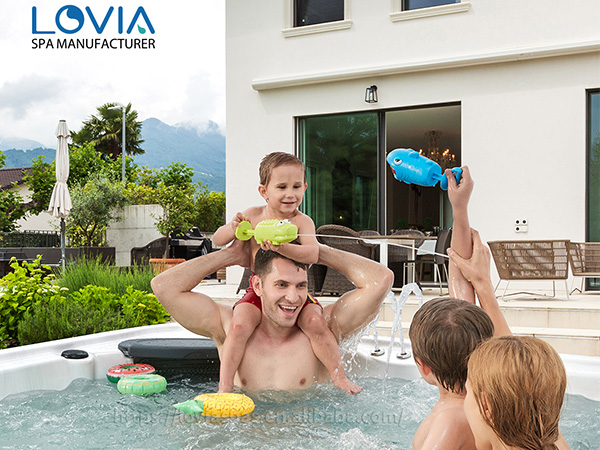
On our website you will find freestanding bathtubs in a variety of materials, sizes and designs (including but not limited to) to suit your unique needs and personal preferences.
We also offer a bespoke service and professional consultation to ensure you find the best freestanding tubs to give your bathroom a new look.
Visit LOVIASPA today and discover the best bathtub just for you!
